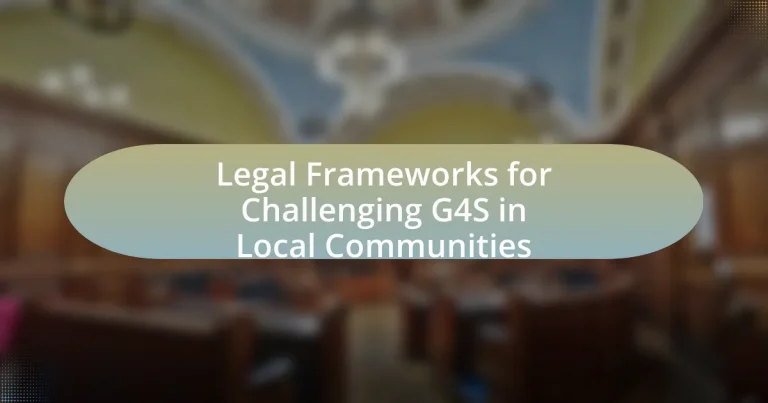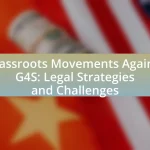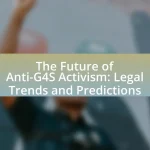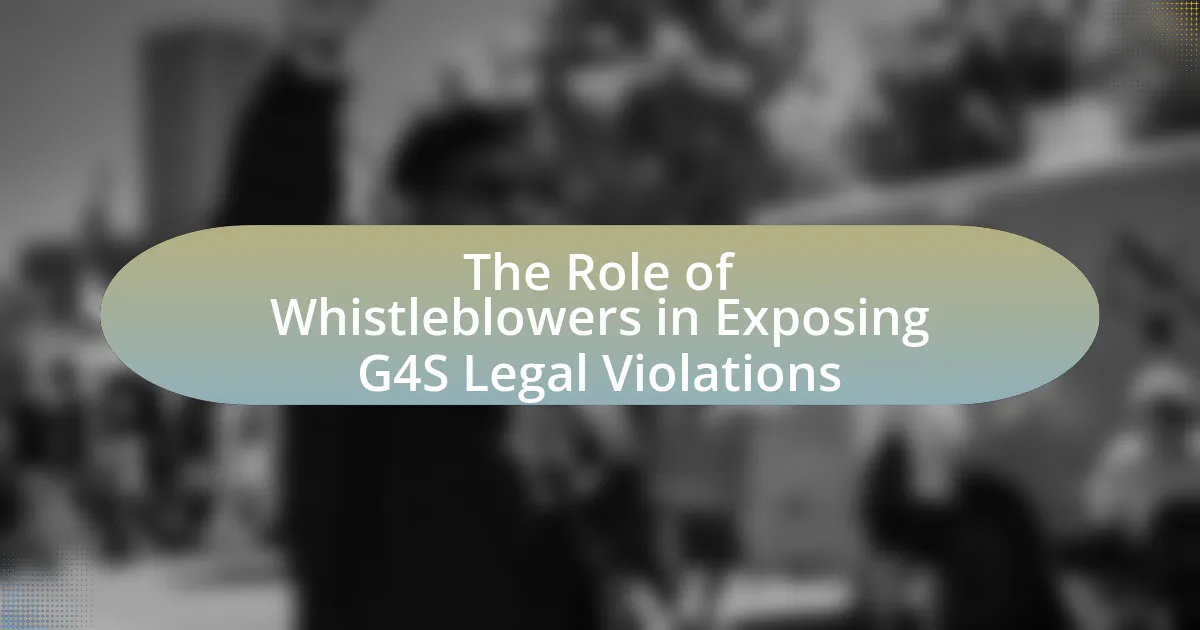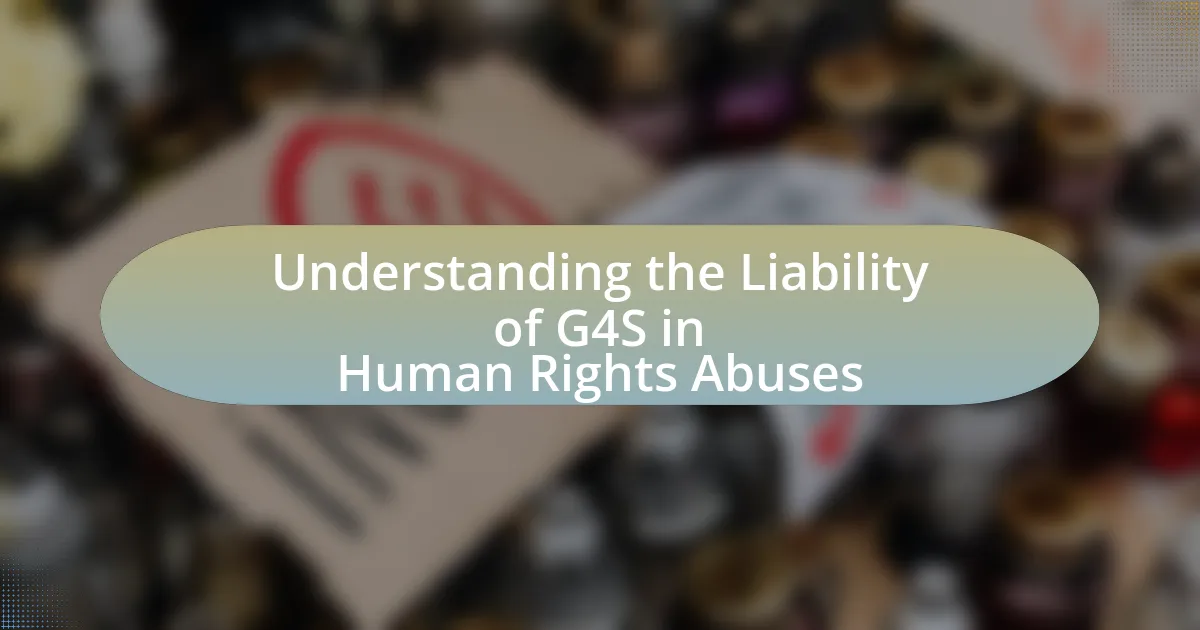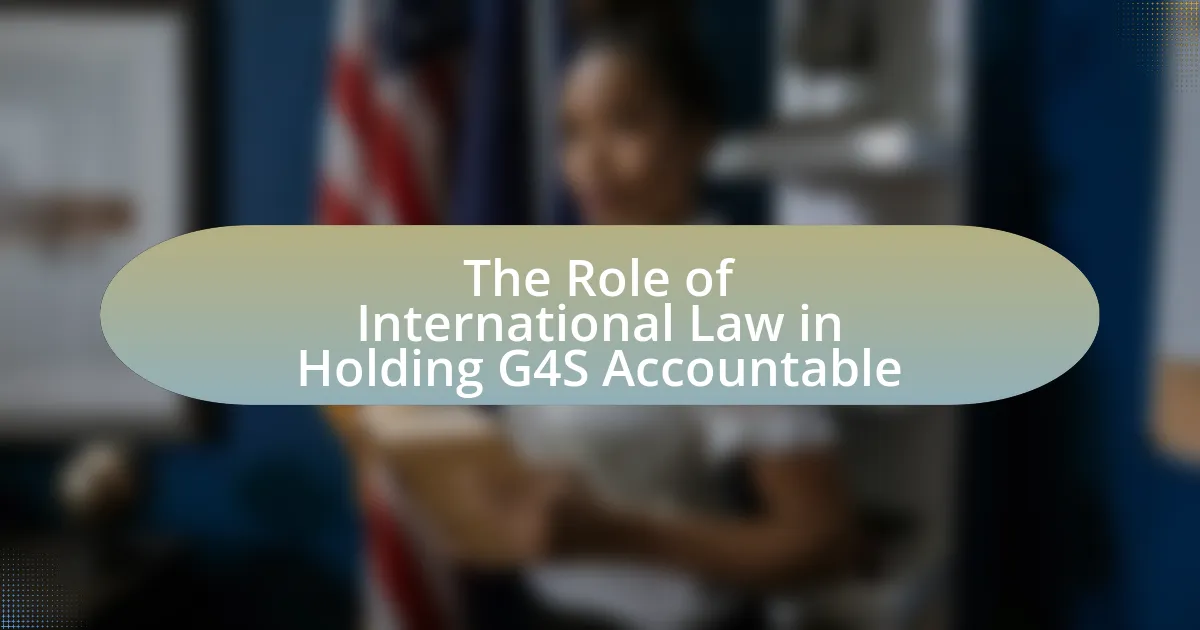The article focuses on the legal frameworks available for local communities to challenge the practices of G4S, a global security company. It outlines various laws, including human rights laws, contract law, and local governance regulations, that empower communities to contest G4S’s actions and demand accountability. The discussion highlights the importance of these frameworks in safeguarding community rights, the challenges faced by communities in pursuing legal action, and the potential outcomes of such challenges, including increased scrutiny of G4S’s operations and improved community relations. Additionally, the article emphasizes the role of community organizations and legal representation in enhancing the effectiveness of these legal efforts.
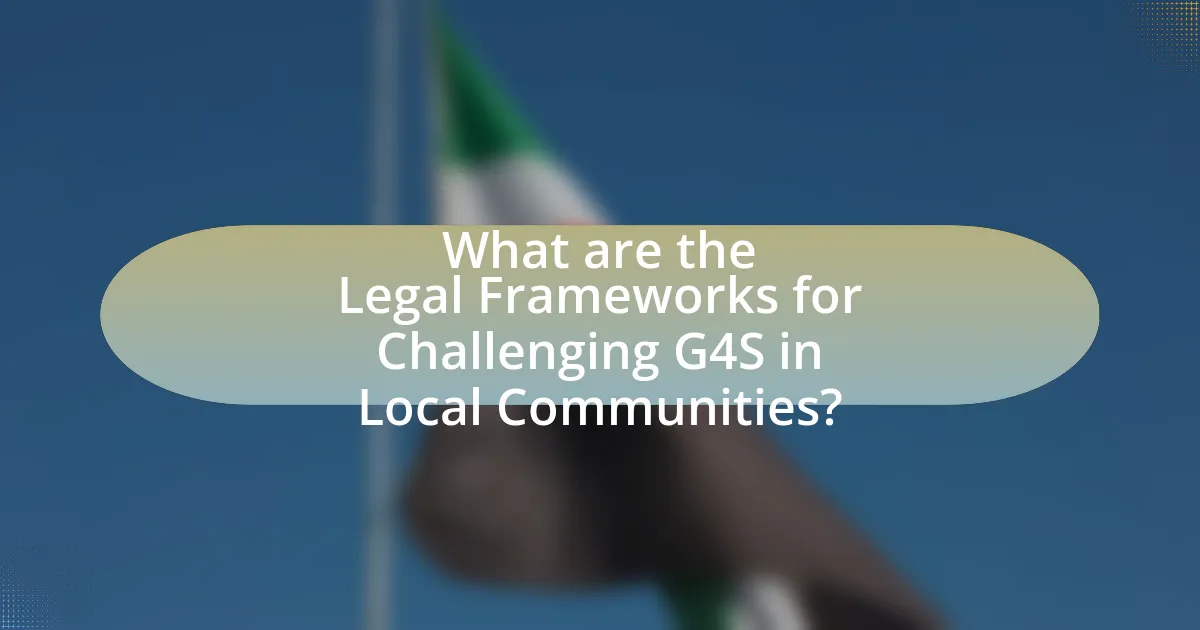
What are the Legal Frameworks for Challenging G4S in Local Communities?
Legal frameworks for challenging G4S in local communities primarily include human rights laws, contract law, and local governance regulations. Human rights laws, such as the International Covenant on Civil and Political Rights, provide a basis for communities to contest actions by G4S that may infringe on individual rights. Contract law allows local entities to challenge G4S based on the terms of service agreements, particularly if there are breaches or failures to meet obligations. Additionally, local governance regulations empower community members to raise concerns through public forums or legal channels, ensuring accountability and transparency in G4S operations. These frameworks collectively enable communities to assert their rights and seek redress against G4S’s practices.
How do these legal frameworks empower local communities?
Legal frameworks empower local communities by providing them with the legal tools and rights necessary to challenge corporate actions that may harm their interests. These frameworks often include laws that protect community rights, such as land use regulations and environmental protections, enabling residents to assert their claims against entities like G4S. For instance, specific legislation may grant communities the authority to engage in legal proceedings to contest land acquisitions or environmental violations, thereby reinforcing their ability to influence decisions that affect their lives. This empowerment is evidenced by cases where communities successfully utilized legal channels to halt projects that threatened their resources or well-being, demonstrating the effectiveness of these frameworks in safeguarding local interests.
What specific laws and regulations support community challenges against G4S?
Community challenges against G4S are supported by various laws and regulations, including the Human Rights Act 1998, which allows individuals to challenge actions that violate their rights, and the Equality Act 2010, which prohibits discrimination and can be invoked in cases where G4S’s practices disproportionately affect marginalized groups. Additionally, local government regulations and public procurement laws can be leveraged to contest G4S’s contracts and operations, particularly if they fail to meet community standards or ethical guidelines. These legal frameworks provide a basis for communities to hold G4S accountable for its actions and demand compliance with established rights and standards.
How do these frameworks vary by region or jurisdiction?
Legal frameworks for challenging G4S in local communities vary significantly by region or jurisdiction due to differences in legal systems, regulatory environments, and cultural contexts. For instance, in the European Union, stringent regulations on private security firms emphasize accountability and transparency, while in the United States, the legal landscape is shaped by state laws that can differ widely, allowing for varying degrees of oversight and community engagement. Additionally, in regions with emerging economies, such as parts of Africa and Asia, legal frameworks may be less developed, leading to challenges in enforcing rights and regulations against private security companies like G4S. These variations are influenced by historical factors, local governance structures, and the level of civil society engagement in each jurisdiction.
Why is it important to challenge G4S in local communities?
Challenging G4S in local communities is important to ensure accountability and protect community rights. G4S, as a global security company, has faced criticism for its involvement in controversial practices, including human rights violations and excessive use of force. By challenging G4S, communities can advocate for transparency, demand adherence to ethical standards, and promote the enforcement of local laws that safeguard public welfare. For instance, reports from organizations like Amnesty International have highlighted instances where G4S’s operations have led to negative impacts on marginalized groups, underscoring the necessity for community action to address these issues effectively.
What impact does G4S have on local communities?
G4S has a significant impact on local communities primarily through its provision of security services, which can enhance safety but also lead to concerns regarding civil liberties. The presence of G4S can deter crime and provide a sense of security for businesses and residents, as evidenced by studies showing reduced crime rates in areas with increased security measures. However, G4S’s operations have also faced criticism for potential overreach and the militarization of public spaces, which can lead to tensions between security personnel and community members. This duality highlights the complex relationship between G4S and local communities, where the benefits of enhanced security must be weighed against the implications for community trust and civil rights.
How can legal challenges lead to positive changes in community dynamics?
Legal challenges can lead to positive changes in community dynamics by empowering residents to advocate for their rights and fostering greater accountability among institutions. When communities engage in legal actions against entities like G4S, they often highlight systemic issues such as inadequate security practices or violations of civil rights. This process can mobilize community members, encouraging collective action and dialogue around shared concerns. For instance, successful legal challenges can result in policy reforms that enhance transparency and improve community relations with security providers. Additionally, these challenges can raise public awareness about local issues, prompting broader societal discussions and encouraging other communities to pursue similar actions for justice and reform.
What strategies can communities employ within these legal frameworks?
Communities can employ advocacy, coalition-building, and legal action strategies within legal frameworks to challenge G4S. Advocacy involves raising awareness about the impacts of G4S operations, which can mobilize public support and influence policy changes. Coalition-building allows communities to unite with other stakeholders, such as human rights organizations, to strengthen their position and resources. Legal action can include filing lawsuits or complaints based on violations of local, national, or international laws, which can compel G4S to adhere to legal standards. For instance, communities have successfully utilized the legal framework of human rights laws to hold corporations accountable for their actions, demonstrating the effectiveness of these strategies.
What role do community organizations play in legal challenges against G4S?
Community organizations play a crucial role in legal challenges against G4S by mobilizing grassroots support, providing legal resources, and amplifying the voices of affected individuals. These organizations often gather evidence of misconduct, such as human rights violations or contractual breaches, which can be pivotal in legal proceedings. For instance, community groups have successfully documented instances of excessive force used by G4S personnel, which has led to lawsuits and increased scrutiny of the company’s practices. Additionally, they often collaborate with legal experts to navigate complex legal frameworks, ensuring that the rights of marginalized communities are represented effectively in court. This collective action not only strengthens legal cases but also raises public awareness about G4S’s operations, thereby influencing policy changes and corporate accountability.
How can legal representation enhance the effectiveness of community challenges?
Legal representation enhances the effectiveness of community challenges by providing expert guidance on legal rights and procedures, which empowers communities to navigate complex legal systems. This expertise ensures that community members can effectively articulate their grievances, comply with legal requirements, and present compelling cases in court or negotiations. For instance, communities that have engaged legal representation in environmental disputes have seen higher success rates in achieving favorable outcomes, as legal professionals can leverage relevant laws and precedents to strengthen their arguments. Additionally, legal representation can facilitate access to resources and networks that amplify community voices, thereby increasing the likelihood of successful advocacy against entities like G4S.
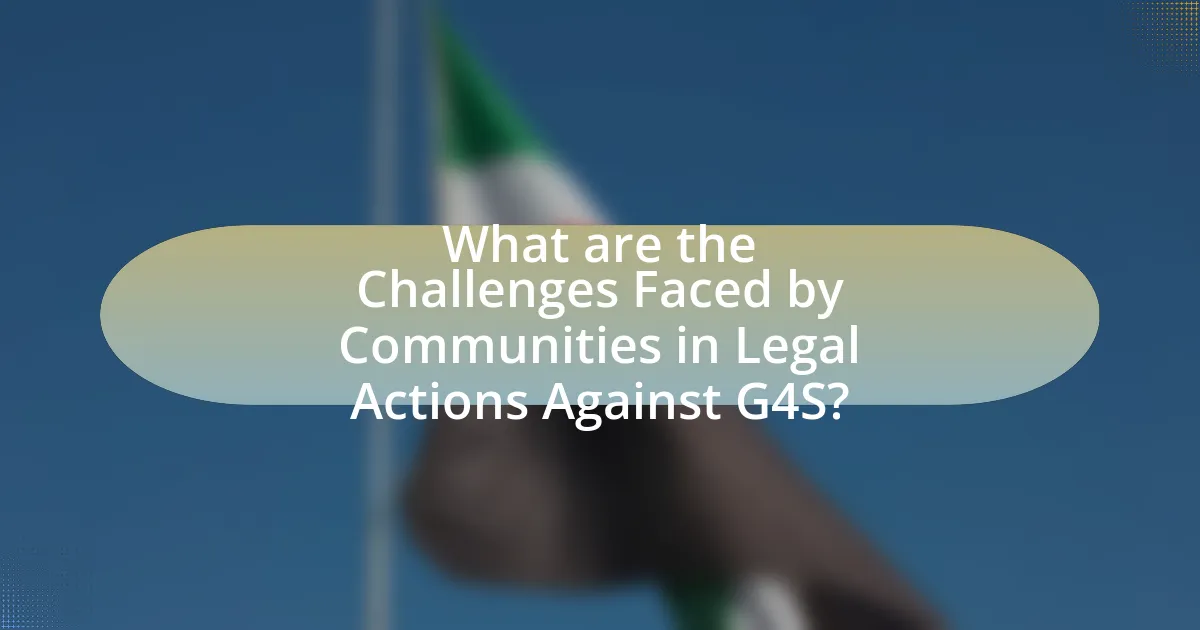
What are the Challenges Faced by Communities in Legal Actions Against G4S?
Communities face significant challenges in legal actions against G4S, primarily due to resource limitations, legal complexities, and systemic barriers. Resource limitations include insufficient funding for legal representation and expert witnesses, which hampers their ability to mount effective cases. Legal complexities arise from navigating intricate legal frameworks and regulations that often favor large corporations like G4S, making it difficult for communities to understand and utilize their rights. Systemic barriers, such as power imbalances and potential intimidation from a large security firm, further discourage communities from pursuing legal action. These factors collectively hinder the ability of communities to successfully challenge G4S in court.
What obstacles do communities encounter when pursuing legal action?
Communities encounter several obstacles when pursuing legal action, including financial constraints, lack of legal knowledge, and systemic biases within the legal system. Financial constraints often limit access to legal representation, as many communities may not have the resources to hire attorneys or cover court costs. Additionally, a lack of legal knowledge can hinder communities from effectively navigating the complexities of the legal system, making it difficult to understand their rights and the processes involved. Systemic biases, such as those favoring larger corporations like G4S, can further disadvantage communities, leading to unequal treatment in legal proceedings. These factors collectively create significant barriers that can impede the pursuit of justice for communities.
How does funding affect the ability of communities to challenge G4S?
Funding significantly enhances the ability of communities to challenge G4S by providing necessary resources for legal action, advocacy, and public awareness campaigns. When communities secure funding, they can hire legal experts, conduct research, and mobilize grassroots efforts to address grievances against G4S, a private security company often criticized for its practices. For instance, organizations like the International Network of People Who Use Drugs have successfully utilized funding to challenge G4S’s involvement in detention and deportation practices, demonstrating that financial support directly correlates with the effectiveness of community-led initiatives.
What legal complexities can hinder community efforts?
Legal complexities that can hinder community efforts include zoning laws, regulatory compliance, and liability issues. Zoning laws can restrict the types of activities that communities can undertake, limiting their ability to organize events or establish community spaces. Regulatory compliance often requires communities to navigate complex legal frameworks, which can be time-consuming and resource-intensive, diverting focus from community initiatives. Liability issues can deter community members from participating in activities due to fears of legal repercussions, especially in cases where accidents or injuries may occur. These legal barriers can significantly impede the effectiveness and sustainability of community efforts.
How can communities overcome these challenges?
Communities can overcome challenges related to G4S by leveraging legal frameworks to advocate for their rights and interests. By understanding local laws and regulations, communities can organize collective actions, such as petitions or lawsuits, to address grievances against G4S practices. For instance, successful legal actions in various jurisdictions have demonstrated that communities can hold security firms accountable for violations of civil rights, thereby reinforcing their legal standing. Additionally, collaboration with legal aid organizations can provide communities with the necessary resources and expertise to navigate complex legal systems effectively.
What resources are available to assist communities in legal battles?
Communities can access various resources to assist in legal battles, including legal aid organizations, pro bono legal services, community law clinics, and advocacy groups. Legal aid organizations provide free or low-cost legal assistance to individuals and communities facing legal challenges, ensuring access to justice. Pro bono legal services, offered by private law firms and individual attorneys, help communities by providing legal representation without charge. Community law clinics, often affiliated with law schools, offer legal advice and representation to underserved populations. Advocacy groups focus on specific issues, such as civil rights or environmental justice, and can provide resources, support, and legal expertise to bolster community efforts in legal disputes. These resources collectively empower communities to effectively challenge legal issues and advocate for their rights.
How can collaboration among communities strengthen legal efforts?
Collaboration among communities can strengthen legal efforts by pooling resources, sharing knowledge, and amplifying voices to create a unified front against legal challenges. When communities work together, they can combine legal expertise, financial support, and grassroots mobilization, which enhances their ability to challenge entities like G4S effectively. For instance, joint legal actions or collective advocacy campaigns can lead to increased visibility and pressure on legal systems, resulting in more favorable outcomes. Historical examples, such as the successful coalition-building efforts in environmental justice cases, demonstrate that collaborative approaches can lead to significant legal victories, thereby validating the effectiveness of community collaboration in legal contexts.
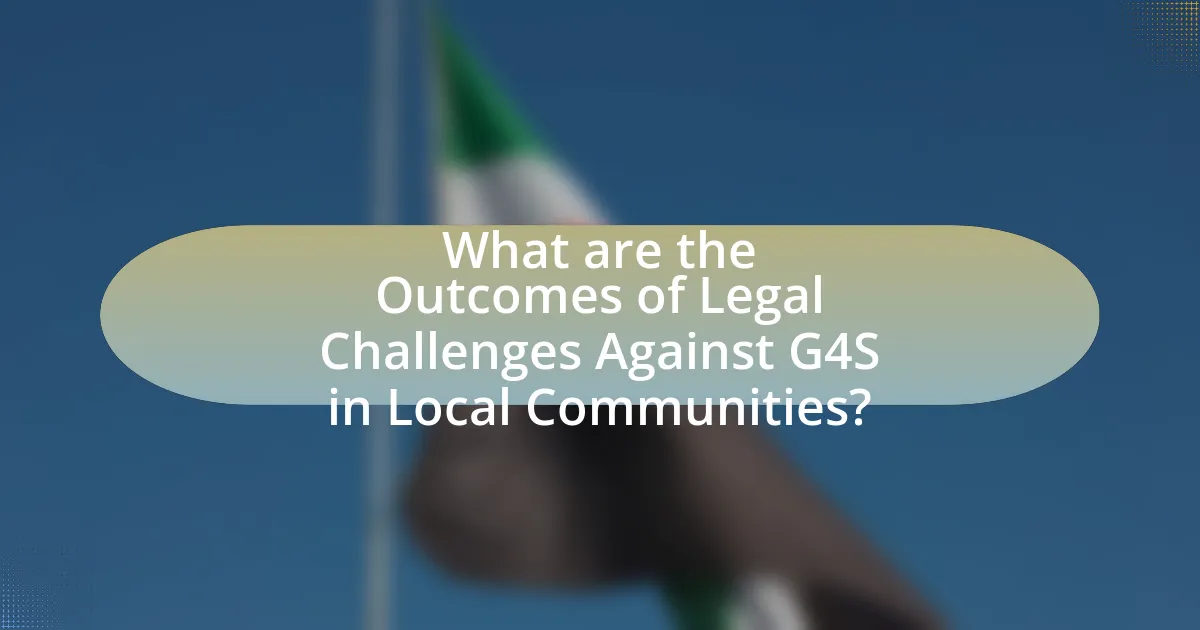
What are the Outcomes of Legal Challenges Against G4S in Local Communities?
Legal challenges against G4S in local communities often result in increased scrutiny of the company’s practices, leading to changes in operational policies and community relations. For instance, lawsuits related to alleged human rights violations or inadequate service delivery have prompted G4S to enhance its training programs and implement more rigorous oversight measures. Additionally, settlements from these legal challenges can result in financial compensation for affected individuals and communities, as seen in cases where G4S was held accountable for its actions. These outcomes not only affect G4S’s reputation but also influence broader discussions on accountability and corporate responsibility within the security industry.
What successes have communities achieved through legal frameworks?
Communities have achieved significant successes through legal frameworks by effectively challenging the practices of G4S, a global security company. For instance, legal actions have led to the cessation of unlawful detentions and the enforcement of labor rights, as seen in various cases where community coalitions utilized local laws to hold G4S accountable for its operations. In 2019, a coalition of community organizations in the UK successfully campaigned for the termination of G4S contracts with local authorities, citing violations of human rights and inadequate service delivery. This legal pressure resulted in several municipalities opting to end their agreements with G4S, demonstrating the power of legal frameworks in promoting accountability and protecting community interests.
How have legal victories influenced G4S’s operations in local areas?
Legal victories have significantly influenced G4S’s operations in local areas by compelling the company to adapt its practices and policies to comply with legal standards and community expectations. For instance, successful lawsuits against G4S for labor violations or human rights abuses have led to increased scrutiny of their hiring practices and operational protocols, prompting the company to implement more rigorous training and oversight measures. These adaptations are often a direct response to legal outcomes that highlight deficiencies in their previous operations, thereby reshaping their engagement with local communities and enhancing accountability.
What lessons can be learned from past legal challenges against G4S?
Past legal challenges against G4S highlight the importance of accountability and transparency in private security operations. These cases often reveal systemic issues such as inadequate training, failure to adhere to human rights standards, and lack of oversight, which can lead to legal repercussions and reputational damage. For instance, G4S faced lawsuits related to allegations of excessive force and mistreatment of detainees, emphasizing the need for robust compliance mechanisms and ethical practices within the organization. Additionally, these challenges underscore the necessity for communities to engage in advocacy and legal action to hold private security firms accountable, thereby reinforcing the role of local governance in overseeing such entities.
What are the potential long-term effects of these legal challenges?
The potential long-term effects of legal challenges against G4S in local communities include increased accountability and transparency in security operations. These legal actions can lead to significant changes in policies and practices, as communities demand better oversight and ethical conduct from security firms. For instance, successful legal challenges may result in stricter regulations governing the use of force and the treatment of individuals by security personnel, thereby fostering a culture of compliance with human rights standards. Additionally, these challenges can empower local communities, encouraging them to engage more actively in governance and oversight of security services, which can lead to improved community relations and trust. Historical examples, such as the legal actions taken against private security firms in various countries, demonstrate that sustained legal pressure can lead to systemic reforms and enhanced community safety.
How can sustained legal efforts reshape community relations with G4S?
Sustained legal efforts can reshape community relations with G4S by holding the company accountable for its actions and fostering transparency. Legal actions, such as lawsuits or advocacy for policy changes, can address grievances related to G4S’s operations, thereby demonstrating to the community that their concerns are taken seriously. For instance, successful litigation against G4S for alleged human rights violations can lead to improved practices and policies, which in turn can enhance trust and cooperation between G4S and local communities. Additionally, consistent legal challenges can compel G4S to engage in dialogue with community stakeholders, ultimately leading to more collaborative relationships and a better understanding of community needs.
What implications do these outcomes have for future community activism?
The outcomes of legal frameworks for challenging G4S in local communities imply that future community activism can leverage these frameworks to enhance accountability and transparency in corporate practices. By establishing legal precedents, communities can effectively mobilize against corporate misconduct, as seen in cases where legal actions have led to increased scrutiny of G4S operations. For instance, successful litigation against G4S for human rights violations has empowered communities to demand better oversight and ethical practices, demonstrating that legal avenues can yield tangible results in activism. This trend suggests that communities will increasingly utilize legal strategies to advocate for their rights and influence corporate behavior, thereby strengthening the overall impact of community activism.
What practical steps can communities take to effectively challenge G4S?
Communities can effectively challenge G4S by organizing collective actions, such as protests and public awareness campaigns, to highlight issues related to G4S’s operations. These actions can draw attention to concerns about human rights violations, excessive use of force, or unethical practices associated with G4S. For instance, in 2019, communities in the UK successfully campaigned against G4S’s involvement in immigration detention centers, leading to increased scrutiny and calls for accountability. Additionally, communities can engage in legal actions, such as filing complaints or lawsuits based on local laws that govern corporate conduct, thereby holding G4S accountable for any violations. By leveraging local legal frameworks, communities can create pressure for change and promote transparency in G4S’s operations.
How can communities build a strong legal case against G4S?
Communities can build a strong legal case against G4S by gathering evidence of misconduct, such as violations of human rights or contractual obligations. This involves documenting incidents, collecting testimonies from affected individuals, and obtaining relevant records, such as contracts and internal communications. Legal frameworks, including tort law and human rights legislation, provide avenues for claims against G4S, particularly if there is a pattern of negligence or abuse. For instance, communities can reference specific cases where G4S has faced legal action for similar issues, demonstrating a precedent for accountability. Engaging legal experts to analyze the evidence and formulate a strategy based on applicable laws enhances the strength of the case.
What best practices should communities follow when engaging in legal challenges?
Communities should follow a structured approach when engaging in legal challenges, which includes thorough research, coalition building, and strategic communication. Conducting comprehensive research on relevant laws and precedents ensures that communities understand their legal standing and the potential outcomes of their challenges. Building coalitions with other affected groups enhances resources and strengthens the case, as seen in successful community-led legal actions against corporations. Additionally, maintaining clear and consistent communication with stakeholders, including legal representatives and community members, fosters transparency and unity, which are critical for effective advocacy. These practices have been demonstrated in various legal challenges where organized community efforts led to favorable rulings, highlighting their importance in the legal process.
